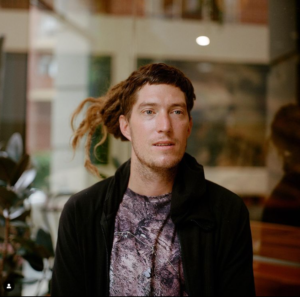31 March 2022
 Name: MJ Stowe
Name: MJ Stowe
Location: Sydney, Australia
Job title: PhD candidate, Kirby Institute, University of New South Wales and previously Program Coordinator at South African Network of People Who Use Drugs (SANPUD)
Specialisms: Health interventions for drug-related harms, person-centred care.
In this month’s Meet the Member we catch up with MJ Stowe who has recently moved to Australia from South Africa. MJ speaks about privilege and how this can impact your path and shines a light on the need for people who use drugs to be better involved in drug policy reform and be given autonomy over their decisions.
Photo kindly supplied by visual storyteller Conor Ashleigh, taken as part of a personal portrait project on harm reduction. View Conor’s work on his Instagram or website.
Tell us a bit about your background and what you do.
As a privileged, white male from South Africa, I’ve benefited from not only my whiteness but also by virtue of being a male in a patriarchal society. This has meant that I’ve been afforded the opportunity to go to university in South Africa where I obtained a Master’s degree. Currently, I’m a PhD candidate at the Kirby Institute, University of New South Wales in Australia, working under the mentorship of Jason Grebely, Louisa Degenhardt, Andrew Scheibe and Greg Dore.
Previously, I have also worked as Programme Coordinator at the South African Network of People Who Use Drugs (SANPUD) and held a research position at the University of Pretoria’s Department of Family Medicine, within the Community Orientated Substance Use Programme (COSUP).
Tell us more about your research, what does it focus on?
At COSUP, my research was situated at the interface between on-the-ground, lived-experience and academia, where I worked with marginalised people who use drugs to develop an evidence-base for the implementation of health interventions to reduce drug-related harms.
For my PhD, I’ll be working on developing person-centred approaches and interventions for people who inject drugs, including i) assessing fatal and non-fatal opioid-related overdoses within a project called ETHOS Engage ; ii) implementing peer-lead, mobile health services to people who use drugs; and iii) exploring preferences of different opioid agonist therapies.
What is the most important issue facing people who use drugs in South Africa and why?
It’s difficult to say what’s the most important issue facing people who use drugs, because it differs so much between groups and individuals. However, in my opinion, one pertinent issue is that people who use drugs, in particular Black and Brown people, are not meaningfully involved in drug policy reform in South Africa.
People who use drugs, including those from gender and sexual minorities are not given autonomy and agency over decision making within harm reduction implementation and advocacy activities.
We need to give people who use drugs, in particular, Black and Brown people, and those from gender and sexual minorities, autonomy and agency over decision-making.
What is the one thing you’ve come across in your career that you think everyone should know if they work with people
who use drugs?
People who use drugs are the experts on issues around health care and harm reduction service delivery. People who use drugs must be centred at discussions around drug policy reform and be meaningfully involved in co-developing and co-implementing harm reduction programmes.
INHSU’s work in South Africa
MJ is one of the many people whom we have had the pleasure of collaborating with from South Africa since our INHSU Africa conference in 2020. The need for people who use drugs to be more meaningfully involved in drug policy has been on the agenda since that meeting.
To help address this, we have recently started a Storytelling for Advocacy Mentor Program in South Africa, to empower people who use drugs to use their voice and their stories to influence change. The program is in its early days and we’ll be sharing stories from the participants soon.
Sign up to our newsletter to be alerted. Sign up here.

